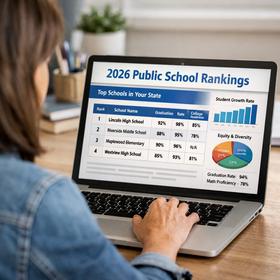Serving 372 students in grades 3-5, Abbot Elementary School ranks in the top 20% of all schools in Massachusetts for overall test scores (math proficiency is top 10%, and reading proficiency is top 10%).
The percentage of students achieving proficiency in math is 71% (which is higher than the Massachusetts state average of 42%). The percentage of students achieving proficiency in reading/language arts is 62% (which is higher than the Massachusetts state average of 44%).
The student-teacher ratio of 13:1 is higher than the Massachusetts state level of 12:1.
Minority enrollment is 24% of the student body (majority Asian), which is lower than the Massachusetts state average of 47% (majority Hispanic).
Quick Facts (2026)
- Grades: 3-5
- Enrollment: 372 students
- Student-Teacher Ratio: 13:1
- Minority Enrollment: 24%
- Overall Testing Rank: Top 20% in MA
- Math Proficiency: 71% (Top 10%)
- Reading Proficiency: 62% (Top 20%)
- Science Proficiency: 60-64% (Top 30%)
- Source: National Center for Education Statistics (NCES), MA Dept. of Education
Top Rankings
Abbot Elementary School ranks among the top 20% of public schools in Massachusetts for:
Category
Attribute
Overall Rank
Math Proficiency
Reading/Language Arts Proficiency
School Overview
Abbot Elementary School's student population of 372 students has stayed relatively flat over five school years.
The teacher population of 29 teachers has grown by 16% over five school years.
Grades Offered
Grades 3-5
(Supplemental Virtual)
(Supplemental Virtual)
Total Students
372 students
Gender %
Total Classroom Teachers
29 teachers
School Rankings
Abbot Elementary School ranks within the top 20% of all 1,626 schools in Massachusetts (based off of combined math and reading proficiency testing data).
The diversity score of Abbot Elementary School is 0.38, which is less than the diversity score at state average of 0.65. The school's diversity has stayed relatively flat over five school years.
Overall Testing Rank
#235 out of 1626 schools
(Top 20%)
(Top 20%)
Math Test Scores (% Proficient)
71%
42%
Reading/Language Arts Test Scores (% Proficient)
62%
44%
Science Test Scores (% Proficient)
60-64%
44%
Student-Teacher Ratio
13:1
12:1
American Indian
n/a
n/a
Asian
21%
7%
Hispanic
2%
25%
Black
n/a
10%
White
76%
53%
Hawaiian
n/a
n/a
Two or more races
1%
5%
All Ethnic Groups
Participates in the National School Lunch Program (NSLP)
Yes
Eligible for Free Lunch
3%
35%
Eligible for Reduced Lunch
1%
4%
School Statewide Testing
School District Name
Source: National Center for Education Statistics (NCES), MA Dept. of Education
Frequently Asked Questions
What is Abbot Elementary School's ranking?
Abbot Elementary School is ranked #235 out of 1,626 schools, which ranks it among the top 20% of public schools in Massachusetts.
What schools are Abbot Elementary School often compared to?
Abbot Elementary Schoolis often viewed alongside schools like John A. Crisafulli Elementary School, Day Elementary School by visitors of our site.
What percent of students have achieved state testing proficiency in math and reading?
71% of students have achieved math proficiency (compared to the 42% MA state average), while 62% of students have achieved reading proficiency (compared to the 44% MA state average).
How many students attend Abbot Elementary School?
372 students attend Abbot Elementary School.
What is the racial composition of the student body?
76% of Abbot Elementary School students are White, 21% of students are Asian, 2% of students are Hispanic, and 1% of students are Two or more races.
What is the student-teacher ratio of Abbot Elementary School?
Abbot Elementary School has a student ration of 13:1, which is higher than the Massachusetts state average of 12:1.
What grades does Abbot Elementary School offer ?
Abbot Elementary School offers enrollment in grades 3-5 (Supplemental Virtual).
What school district is Abbot Elementary School part of?
Abbot Elementary School is part of Westford School District.
School Reviews
Review Abbot Elementary School. Reviews should be a few sentences in length. Please include any comments on:
- Quality of academic programs, teachers, and facilities
- Availability of music, art, sports and other extracurricular activities
Recent Articles

Public School Rankings: Are They Accurate in 2026?
Are public school rankings accurate? Learn how rankings are calculated in 2026, what they miss, and how families can evaluate schools wisely.

How Are U.S. Public Schools Doing in 2026?
A 2026 update on how U.S. public schools are performing academically, financially, and socially in a post-pandemic era.

Helping Your Child Navigate Friendship Drama at School
Meta Description: Practical 2026 strategies for helping your child navigate friendship drama at school with confidence, empathy, and resilience.







